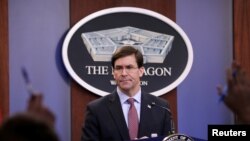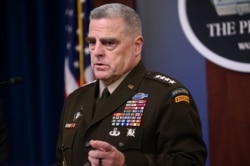The United States is not withdrawing troops from Iraq, Defense Secretary Mark Esper said Monday, with the top U.S. military officer explaining that a letter from a senior military officer that appeared to suggest withdrawal was a poorly worded mistake.
"There's been no decision whatsoever to leave Iraq," Esper said. "There's no decision to leave, nor did we issue any plans to leave."
A letter circulated Monday on Twitter had been sent to the Iraqi government from a commander in Iraq. In it, the commander said the U.S. respects Iraq's "decision to order our departure" and that U.S. troops would be "repositioning over the course of the coming days and weeks to prepare for onward movement."
General Mark Milley, the Chairman of the Joint Chiefs of Staff, told reporters Monday that the letter was merely a draft sent to Iraqi allies for input and in order to coordinate the language.
"It was a mistake, an honest mistake, a draft unsigned letter because we are moving forces around and we have increased helicopter movement," Milley said.
He added that the draft letter was "poorly worded" and "implies withdrawal."
"That is not what's happening," Milley said.
Germany, which has about 120 troops in Iraq to help train Iraqi forces, said Tuesday it planned to move about 30 troops from Baghdad and Taji to Jordan and Kuwait due to security concerns amid heightened tensions in the region. German officials said the soldiers could return if the training mission resumes.
Esper and Milley also discussed their decision to kill Iranian Quds Force leader Qassem Soleimani in a strike last week, with both asserting that he was planning attacks on Americans.
"He was planning, coordinating and synchronizing significant combat operations against U.S. military forces in the region, and it was imminent," Milley said, adding that decision-makers would have been "culpably negligent to the American people" had they not struck Soleimani.
No evidence has been presented to reporters of the potential attacks.
Esper, when asked if he would target cultural sites in Iran, said that the U.S. military would "follow the laws of armed conflict," which prohibit such attacks.









